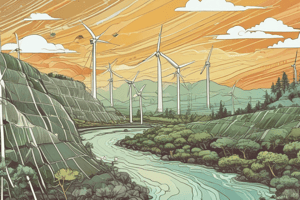Podcast
Questions and Answers
Which of the following strategies primarily focuses on removing existing greenhouse gases from the atmosphere rather than reducing emissions?
Which of the following strategies primarily focuses on removing existing greenhouse gases from the atmosphere rather than reducing emissions?
- Adopting afforestation and reforestation initiatives. (correct)
- Implementing carbon taxes on industries.
- Investing in renewable energy sources like solar and wind.
- Applying carbon capture and storage (CCS) technology to power plants.
A city planner is tasked with reducing the carbon footprint of the transportation sector. Which combination of strategies would be most effective?
A city planner is tasked with reducing the carbon footprint of the transportation sector. Which combination of strategies would be most effective?
- Lowering parking fees across the city and reducing investment in cycling infrastructure.
- Subsidizing gasoline prices and decreasing investment in electric vehicle charging stations.
- Investing in new highway construction and promoting the use of larger personal vehicles.
- Expanding public transportation, implementing congestion pricing, and incentivizing electric vehicle adoption. (correct)
A large manufacturing company is exploring options to reduce its carbon emissions. Which approach would provide the most direct economic incentive for them to decrease their emissions?
A large manufacturing company is exploring options to reduce its carbon emissions. Which approach would provide the most direct economic incentive for them to decrease their emissions?
- Implementing sustainable agriculture practices on company-owned land.
- Participating in a cap-and-trade system where they must purchase allowances for their emissions. (correct)
- Switching to renewable energy sources for their electricity needs.
- Implementing energy efficiency upgrades in their facilities.
Which of the following agricultural practices would be most effective in both reducing greenhouse gas emissions and enhancing carbon sequestration in soils?
Which of the following agricultural practices would be most effective in both reducing greenhouse gas emissions and enhancing carbon sequestration in soils?
What is the primary goal of Solar Radiation Management (SRM) geoengineering techniques?
What is the primary goal of Solar Radiation Management (SRM) geoengineering techniques?
A developing nation is seeking assistance to implement climate change mitigation strategies. What form of support from developed countries would be most beneficial for long-term, sustainable impact?
A developing nation is seeking assistance to implement climate change mitigation strategies. What form of support from developed countries would be most beneficial for long-term, sustainable impact?
Which of the following scenarios best illustrates the successful implementation of a 'feed-in tariff' policy?
Which of the following scenarios best illustrates the successful implementation of a 'feed-in tariff' policy?
What is a key consideration when evaluating the long-term effectiveness of Carbon Capture and Storage (CCS) as a mitigation strategy?
What is a key consideration when evaluating the long-term effectiveness of Carbon Capture and Storage (CCS) as a mitigation strategy?
How do sustainable forest management practices contribute to climate change mitigation?
How do sustainable forest management practices contribute to climate change mitigation?
Which of the following policies would likely be most effective in encouraging businesses to adopt more energy-efficient technologies and practices?
Which of the following policies would likely be most effective in encouraging businesses to adopt more energy-efficient technologies and practices?
Flashcards
Climate Change Mitigation
Climate Change Mitigation
Reducing or preventing greenhouse gas emissions or enhancing gas removal.
Renewable Energy
Renewable Energy
Energy from sources that replenish quickly, like solar, wind, hydro, geothermal, and biomass.
Energy Efficiency
Energy Efficiency
Using less energy to achieve the same outcomes, such as better insulation or efficient appliances.
Carbon Capture and Storage (CCS)
Carbon Capture and Storage (CCS)
Signup and view all the flashcards
Afforestation and Reforestation
Afforestation and Reforestation
Signup and view all the flashcards
Sustainable Transport
Sustainable Transport
Signup and view all the flashcards
Carbon Pricing
Carbon Pricing
Signup and view all the flashcards
Sustainable Agriculture
Sustainable Agriculture
Signup and view all the flashcards
International Cooperation
International Cooperation
Signup and view all the flashcards
Geoengineering
Geoengineering
Signup and view all the flashcards
Study Notes
- Climate change mitigation involves reducing or preventing greenhouse gas emissions into the atmosphere, or enhancing the sinks.
- Mitigation strategies are crucial for limiting future climate change and related impacts.
- Strategies span energy, transport, industry, agriculture, and forestry.
Renewable Energy
- Renewable energy sources: solar, wind, hydro, geothermal, and biomass produce little to no greenhouse gas emissions during operation.
- Investing in renewable energy infrastructure reduces reliance on fossil fuels.
- Government subsidies, tax incentives, and feed-in tariffs encourage renewable energy adoption.
- Technological advancements continuously improve efficiency and reduce costs of renewable energy systems.
Energy Efficiency
- Improving energy efficiency reduces energy use to perform tasks.
- Measures include upgrading building insulation, using energy-efficient appliances, and improving industrial processes.
- Energy-efficient buildings reduce demand for heating/cooling, lowering energy consumption and emissions.
- Energy efficiency standards and building codes drive widespread adoption of energy-saving measures.
- Public awareness campaigns promote energy conservation among individuals and businesses.
Carbon Capture and Storage (CCS)
- CCS captures carbon dioxide emissions from sources, such as power plants and industrial facilities.
- Captured CO2 is transported and stored underground in geological formations, preventing atmospheric entry.
- CCS technology is still under development, but could significantly reduce emissions from fossil fuel-based industries.
- Economic viability and long-term safety of CO2 storage are important for CCS deployment.
- CCS can be applied to existing power plants and new facilities.
Afforestation and Reforestation
- Afforestation is planting trees where there were previously no forests, whereas reforestation replants trees in degraded/destroyed forests.
- Trees absorb CO2 from the atmosphere via photosynthesis, acting as carbon sinks.
- Sustainable forest management ensures long-term health and carbon sequestration capacity.
- Afforestation and reforestation projects provide environmental benefits, like habitat restoration and soil conservation.
Sustainable Transport
- Sustainable transport reduces greenhouse gas emissions from the transport sector.
- Strategies include promoting public transportation, cycling, walking, and electric/hybrid vehicles.
- Investing in public transportation infrastructure, such as bus rapid transit and light rail systems, can make sustainable travel options more attractive.
- Congestion pricing and parking fees can discourage private vehicle use in urban areas.
- Electric vehicles are cleaner alternatives to gasoline-powered cars, especially when powered by renewable energy.
Carbon Pricing
- Carbon pricing mechanisms put a price on carbon dioxide emissions, incentivizing emissions reduction.
- Two main types of carbon pricing are carbon taxes and cap-and-trade systems.
- A carbon tax is a direct tax on each ton of CO2 emitted.
- A cap-and-trade system sets a limit on the total amount of emissions allowed for companies to trade emission allowances.
- Carbon pricing encourages businesses and individuals to adopt cleaner technologies and practices.
- Revenues from carbon pricing can fund climate mitigation projects or reduce other taxes.
Sustainable Agriculture
- Agricultural practices contribute to greenhouse gas emissions through deforestation, fertilizer use, and livestock production.
- Sustainable agriculture reduces these emissions and enhances carbon sequestration in soils.
- Practices include no-till farming, cover cropping, and crop rotation, which improve soil health and reduce the need for synthetic fertilizers.
- Reducing food waste and promoting sustainable diets, such as plant-based diets, can also lower agricultural emissions.
- Improved manure management techniques can reduce methane emissions from livestock operations.
International Cooperation
- Climate change is a global problem requiring international cooperation.
- The Paris Agreement is an international agreement where countries commit to reducing greenhouse gas emissions.
- Developed countries provide financial and technical support to developing countries to help them mitigate and adapt to climate change.
- International collaboration is essential for sharing knowledge, technologies, and best practices for climate mitigation.
- Monitoring and verification mechanisms ensure that countries are meeting emission reduction targets.
Geoengineering
- Geoengineering refers to large-scale interventions in the Earth's climate system to counteract the effects of climate change.
- Two main types of geoengineering are solar radiation management (SRM) and carbon dioxide removal (CDR).
- SRM techniques aim to reflect sunlight back into space, reducing the amount of solar radiation absorbed by the Earth.
- CDR techniques aim to remove CO2 directly from the atmosphere.
- Geoengineering technologies are controversial and carry potential risks and side effects.
- Further research is needed to fully understand the feasibility and impacts of geoengineering.
Studying That Suits You
Use AI to generate personalized quizzes and flashcards to suit your learning preferences.





